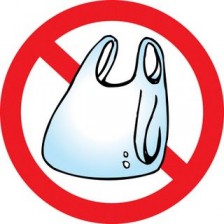Manila a step closer to banning use of plastic bags

Thirty-one councilors voted for the passage of City Ordinance No. 7393 that bans “the use of any form of plastic bags on dry goods and regulating its utilization on wet goods, as well as the use of polystyrene and similar materials as containers for food, goods and other products.”
Asked about the arguments raised by the city’s business sector that will be affected once Mayor Alfredo Lim signed the draft ordinance, Councilors Jocelyn Dawis-Asuncion, one of the authors of the ordinance, said:
“Were not banning the using of plastic altogether . . . we are banning the [use] of plastic for secondary packaging for the fresh refrigerated foods,” she said, while taking into reconsideration plastic’s “heavy packaging uses.”
If the ordinance would be approved for implementation, violators face a fine ranging from P1,000 to P5,000, aside from a maximum prison term of six months, and a one-year cancellation of their license to operate, the draft stated.
Authors of the ordinance said that though “plastics have made our lives easier because of their multifaceted functions, such that we may no longer live with ease and leisure without them . . . a stark reality has caused alarm . . . [and this] the discovery that plastics are non-biodegradable and therefore contributory to the destruction of the environment and the endless, massive flooding of our streets and communities.”
Article continues after this advertisementUntil recycling centers for “single use” bags, such as sando bags, are established to turn these plastics into useful materials, “then maybe we can change the ordinance,” Asuncion said.
Article continues after this advertisement“But for now that it has a maximum impact . . . stop gap first,” Asuncion said.
Muntinlupa, Las Piñas and Makati have implemented the same order.
Earlier reports said plastics accounted for 76 percent of the waste found in Manila Bay, according to a 2010 discards survey conducted by EcoWaste in partnership with the Global Alliance for Incinerator Alternatives and Greenpeace.
Jobs in the plastic industry put at stake
As the ordinance moves another step closer to its full implementation, so does workers in the plastic industry to the doom of their jobs.
In an interview with Crispian Lao, president of the Philippine Plastics Industry Association, he said that with this latest news, “the Philippine plastic industry and the jobs of 175000 families are at stake.”
As to Asuncion’s statement that the ordinance does not endorse paper as a packaging material, Lao has to say: “I agree that none of these ordinances promote paper but the inadvertent consequence, as evidenced by areas where a ban is in place, is a shift to paper bags from imported sources with a 45 percent increase based on the National Statistics Office data, adding that even reusable bags are imported.”
He said that only the ordinance being implemented in Quezon City can be considered as “well thought and properly consulted with all sectors,” noting the statement that the affected industry was “not consulted.”
Lao said the QC ordinance imposes not a ban, but a “thickness regulation with a recovery for recycling component in place and incentives thru discounts or points given by establishments.”
With the ban on sale in the center of trade, “we expect a severe impact on an industry took over 50 years to build,” Lao said.
‘Early Christmas gift for Mother Nature’
Zero waste advocates gave resounding thumbs up to the Manila City Council for its latest “environmental action,” saying that it serves as an advanced gift to nature this coming Christmas.
“We congratulate the people of Manila and their elected representatives for passing the ordinance, which is undeniably an early Christmas gift to Mother Nature. By nipping wasteful consumption in the bud, we give a new lease of life to our plastic-strewn surroundings, creeks and rivers, and to Manila bay itself,” Sonia Mendoza, chairperson of the Mother Earth Foundation said.
The environmental advocates offered president officer, Vice Mayor Isko Moreno and other councilors handwoven bags (bayong) made of palm leaves and water as token of their appreciation for the passage of the ordinance.
For his part, Edwin Alejo, Coordinator of the EcoWaste Coalition, argues that, if one consumer will stop using plastic bags and, instead, use reusable bags, “he or she can save over 20,000 plastic bags in his/her lifetime,” adding to the fact that the slash in the use of plastics would mean “greater financial savings.”
In Las Piñas City, Alejo said the similar ordinance, combined with values formation campaign on the benefits of waste reduction, segregation at source and recycling, has reduced the city waste by 37 percent.
According to site https://www.plasticpledge.org/*<https://www.plasticpledge.org/>, each individual uses 22,176 bags in an average lifetime.
For Ofelia Panganiban of Zero Waste Philippines, meanwhile, City Ordinance 7393 can potentially unleash peoples ingenuity and creativity in finding ecological replacements for the “ubiquitous plastic bags and Styrofoam containers,” noting that an example of replacement is carry bags fashioned out of used shirts and pants, old bed sheets, blankets and pillow cases, empty flour and rice sacks and even retired school bags.
Once approved by Lim, the ordinance will take effect one year after.